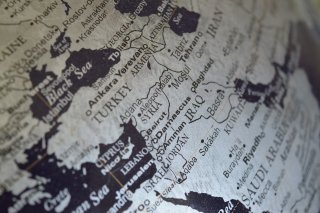Are the UN Security Council's Syria Negotiations Failing?
How a promising format for international discussion about Syria devolved into a UN sideshow.
UN Special Envoy Staffan de Mistura recently wrapped up the fifth round of Geneva peace talks at the end of last week, a dialogue that lasted nine full days but predictably produced zero results. Despite all evidence to the contrary, the international community continues to hope beyond all hope that the deliberations in Geneva will stick and that the warring parties will find it within themselves to put their countrymen above their narrow self-interests. Indeed, if you weren’t happening to pay close attention to the talks, you could be forgiven for thinking that that they were even going on. The media stakeouts by the negotiators that once attracted reporters from major news outlets around the world are now relatively dormant affairs, where only a couple of questions are asked about whether the Geneva process will survive or whether de Mistura himself is on the way to retirement.
To the UN Security Council, the diplomatic forum that former Secretary of State John Kerry and Russian foreign minister Sergey Lavrov created last year is still ultimately the only game in town. Much of this sentiment is due to dearth of the options available to the international community at the present time; although the Astana format directed by Russia, Iran and Turkey was slightly promising in the opening stages, discussions that were geared towards establishing a durable cease-fire in Syria have run into the same problems as other cease-fire deals over the past six years. The fact that representatives of the moderate opposition factions refused to show up for the last Astana discussions last month was revealing, in that not only is there zero trust between rebel units and the Assad regime’s foreign backers in Moscow and Tehran, but that there is also real doubt that the Syrian government would abide by any cessation of hostilities anyway. Given the track record of the Assad regime, that doubt is more than justifiable.
In many ways, the Astana format remains a sideshow to the main event: the UN-mediated political negotiations between the Assad regime and the opposition and within the opposition itself. Nominally, the Security Council is invested in the Geneva talks, having blessed de Mistura’s work on multiple occasions and having sent their own diplomats in the hope of pressuring or cajoling their Syrian allies into staying in the room. Washington, Moscow, London and the UN all continue to participate on the sidelines, encouraging de Mistura to continue poking and prodding the Syrians into some kind of accommodation—regardless of how hopeless the effort may seem at the time. And despite de Mistura putting on a brave face in public and reporting that the Syrian delegations are acting professionally and exchanging ideas about the four baskets on the table—a political transition, constitutional issues, counterterrorism and governance—any neutral observer can see that there isn’t any movement towards a compromise on any of these issues. Indeed, the only accomplishment that de Mistura has to date is the fact that the Syrians haven’t decided to quit the process and fly home.
In Geneva, we have the worst of all worlds: Syrians who seem to be only participating in order to get their talking points out to the media; a new administration in the United States that remains curiously quiet in these discussions; a Security Council that can’t agree on anything related to Syria other than the most rudimentary bromides about respecting the country’s territorial integrity; and Bashar al-Assad, who has no incentive to negotiate his own political future given the military realities on the ground. Expecting any diplomatic progress under these circumstances is contrary to common sense.
Unless Assad inexplicably decides to resign or his security forces start losing ground akin to 2014 and 2015, his delegation will continue to do what they’ve done in Geneva since the first diplomatic talks happened in 2014: denounce the opposition as a collection of foreign puppets and terrorists and drag out the proceedings to the point where the opposition decides to give up or de Mistura finally pulls the plug. The regime’s strategy is the same as it’s always been—delay any serious talk about a political transition and bank on the fact that the Russians and the Iranians will continue to be by their side.
So far—and to the detriment of the Syrian people who continue to be bombed, starved, tortured and forced from their homes—Assad’s calculation is working.
Daniel DePetris is a fellow at Defense Priorities.
Image: Globe featuring Middle East. Pixabay/Public domain

